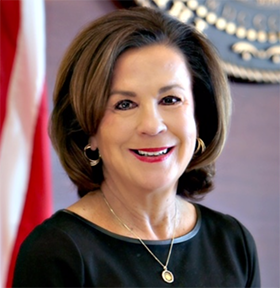Reflections of Missouri Chief Justice Mary R. Russell
Many of the cases judges are asked to decide typically result in some people winning and others losing. But one of the only times everyone leaves the courtroom happy is when an adoption is finalized.

Earlier this month, I had the honor of presiding over the final hearing in an adoption case in the Jasper County circuit court in Joplin. It involved a very lucky 21-month old boy- who was being adopted by the foster parents with whom he had lived since shortly after his birth. I struggled to maintain a judicial demeanor, fighting back tears of happiness as his new parents, who had been his foster parents, testified how much they loved him and had considered him a part of their family since he first came into their home. The adoption hearing was the finalization of the boy legally becoming the natural-born child of these parents, and the little brother to four older siblings.
Adoptions hearings like these take place frequently in courtrooms all across our state. During the last four fiscal years, the number of adoption cases in Missouri ranged from about 2,900 to 3,300 annually. These hearings often serve as a highlight in the work of the judges too. In fact, one presiding judge recently told me he happened to look down during his criminal law docket that followed an adoption hearing and saw the glitter still on his robe from when the little girl sat on his lap after the adoption hearing had ended. Despite the serious judicial demeanor he typically exhibited during criminal cases, he had to smile at the glitter, which reminded him of the innocence of that child and all the promise of her life ahead.
Adoption cases typically start in one of three ways. One involves private adoptions, when parents work with a private organization to pair them with a child. Another involves adoptions by a stepparent, married to one of the child’s natural parents, after the other natural parent has abandoned the child or otherwise has legally given up parental rights. The third type of adoption case is an extension of our juvenile justice system, when a child has been abused, neglected or abandoned and needs a permanent home elsewhere.
Regardless of the type of adoption, the judge must find it is in the child’s best interest to be adopted. To make this determination, the judge reviews recommendations made by division of family services workers who have completed a home study. The local juvenile office also must make a report. Further, the child to be adopted is appointed an attorney, called a “guardian ad litem,” who investigates the new family and verifies whether adoption is in the child’s best interest.
The little boy’s adoption over which I presided was the third type of case and dependent on foster parents, of whom there is a shortage in our state. Over the last year, there have been between about 12,000 and 13,000 children in foster care in Missouri. When children’s families are unable to care for them, they need foster parents to provide safe and caring temporary homes until they can be reunited with their natural parents or, if reunification is not possible, until the children can be adopted. Department of Social Services officials have said they need more qualified foster families to provide nurturing homes. To learn more about becoming a foster parent, please visit https://dss.mo.gov/cd/foster-care/becoming-a-foster-parent.htm.
There also is a shortage of child advocate volunteers. Many proceedings in the juvenile justice system are made less scary and more successful for the children involved thanks to thousands of ordinary citizens across the state who serve as volunteers for Missouri’s nonprofit Court Appointed Special Advocates (CASA) association. These volunteers advocate for the best interest of children who have experienced abuse or neglect, getting to know the children and their families well, and providing stable connections for the children throughout the legal process. In fact, children with CASA volunteers are substantially less likely to spend time in long term foster care and are more likely to be adopted. To learn more about volunteering in CASA programs in your area, visit https://www.mocasa.org/.
I am grateful for the opportunity I had in Joplin to be a part of such a heartwarming case. It was such a joy to pronounce that little boy was now the natural child of his adoptive parents. The judge who typically handles this docket makes balloon animals for every child – and this case was no exception. Even though it was nap time when the hearing took place, and the little boy slept through much of the proceeding, we took time afterward to take photos so he always can see the incredible moment when he became part of his entire new “forever” family.
